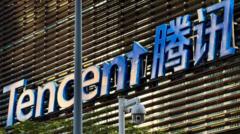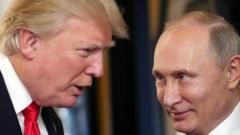The Pentagon's updated list now counts 134 firms connected to China's military, with Tencent and CATL pushing back against the designation as unjust.
US Designates Tencent and CATL as Military-Related Firms Amidst Growing Tensions

US Designates Tencent and CATL as Military-Related Firms Amidst Growing Tensions
The US raises alarms by linking tech companies Tencent and CATL to the Chinese military, warning American entities of associated risks.
The United States has recently identified several Chinese technology firms, including the gaming and social media powerhouse Tencent and the battery manufacturer CATL, as being co-operational with the Chinese military. This development serves as a cautionary signal for American businesses about the potential implications of partnering with Chinese companies. Although being listed does not lead to an outright ban, it does intensify the scrutiny and may prompt the US Treasury Department to impose sanctions on these entities.
In response, both Tencent—known for its widely used messaging app WeChat—and CATL have firmly denied any military affiliations, arguing that the listing represents a glaring misinterpretation of their operations. The Chinese government described the US action as an “unreasonable suppression” that could deter foreign investment in their country.
The Department of Defense (DOD) maintains an annual updated list of Chinese military firms, officially titled the Section 1260H list, which now comprises 134 businesses. This initiative aligns with the US strategy to counter perceived advancements in China's military strength through technology sourced from domestic companies, academic institutions, and research initiatives.
Following the recent designation, Tencent labeled the classification as "clearly a mistake," asserting, "We are not a military company or supplier." The firm emphasized that, unlike sanctions or export limitations, this designation does not impact their business operations. Similarly, CATL vocally disagreed with the implications surrounding their recent classification.
Liu Pengyu, a representative from the Chinese embassy in Washington, criticized the US approach, noting that such practices contravene the principles of market competition and international trade rules, which the US has historically championed. The Pentagon has faced mounting pressure from US lawmakers, particularly as American automotive giant Ford plans to funnel $2 billion into a new battery plant in Michigan and intends to license technology from CATL.
This regulatory move occurs against a backdrop of ongoing strain between the two economic powerhouses. It follows the anticipation of Donald Trump, who has previously adopted a hardline stance on China, returning to the White House this month. Last year, the Pentagon was also embroiled in lawsuits from drone manufacturer DJI and Lidar technology producer Hesai Technologies regarding their presence on this contentious list, which now continues to include both companies.





















